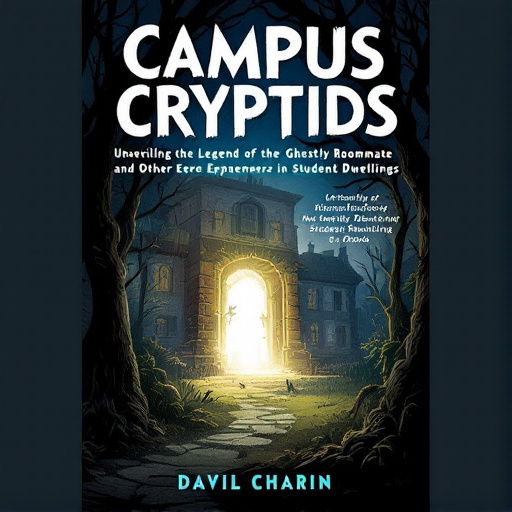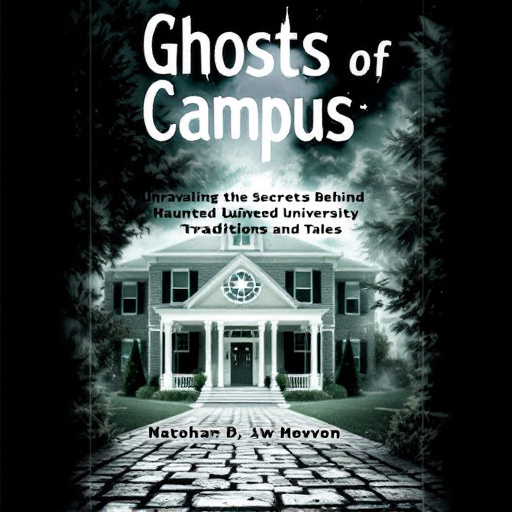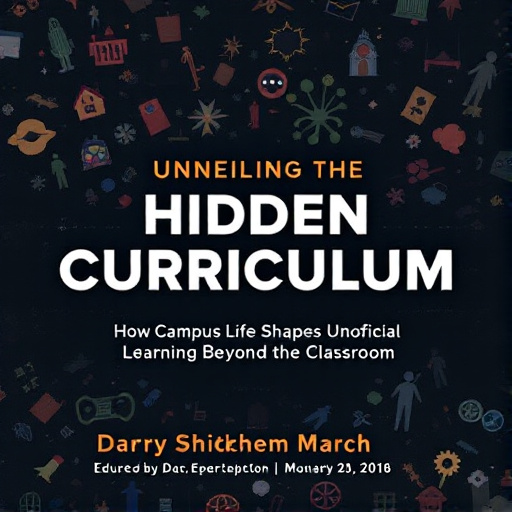Featured Articles
- Bizarre Dorm Decor: How Quirky Aesthetics Are Redefining Campus Living Spaces
- Campus Cryptids: Unveiling the Legend of the Ghostly Roommate and Other Eerie Ephemera in Student Dwellings
- "From Dorm to Digital: How Virtual Reality is Redefining Campus Hangouts and Social Interactions"
- "Ghosts of Campus: Unraveling the Secrets Behind Haunted University Traditions and Tales"
- "Silent Study Zones: The Rise of Soundless Spaces for Mental Clarity in Chaotic Campus Life"
Unveiling the Hidden Curriculum: How Campus Life Shapes Unofficial Learning Beyond the Classroom
Unveiling the Hidden Curriculum: How Campus Life Shapes Unofficial Learning Beyond the Classroom
The hidden curriculum of campus life plays a crucial role in shaping individuals beyond their formal education, encompassing social skills, life lessons, and invaluable experiences. This article explores how these unofficial learning experiences within college settings are often just as significant as traditional classroom education.
The Landscape of Campus Life
Imagine strolling through campus on a sunny afternoon, surrounded by laughter, spirited debate, and diverse cultures colliding—this scene is just a slice of the vibrant tapestry that is college life. For many students, campus is not just an educational institution; it’s a whole new world filled with nuggets of wisdom waiting to be discovered.
What is the Hidden Curriculum?
While the term "hidden curriculum" often refers to the lessons and values taught implicitly, it encompasses a far broader spectrum on a college campus. Unlike your typical syllabus, this unofficial curriculum is not found in textbooks or lectures but is instead learned through interactions, experiences, and a myriad of social dynamics. According to a study published in the Journal of Educational Psychology, up to 70% of an individual's learning occurs through informal experiences rather than traditional educational methods (Wang et al., 2020).
Case Study: The Power of Student Organizations
Let's take a look at a real-world example: the Student Senate at a mid-sized public university. When Emily, a first-year student, joined the Senate, she entered a space filled with opportunities that extended beyond academics. As Emily navigated her role, she learned about leadership, negotiation, and public speaking—skills that aren’t necessarily taught in the classroom. In fact, her peers reported that involvement in student organizations greatly enhanced their communication skills, with 85% stating that this experience prepared them for the professional environment ahead (Student Life Survey, 2021).
Connecting with Diversity: Unofficial Teaching Moments
College campuses are often melting pots of cultures, ideas, and perspectives. Engaging with a diversity of student backgrounds, as Melvin discovered during his freshman year, introduces him to an array of worldviews and fosters vital understanding and empathy. This form of learning—often referred to as cultural intelligence—can be even more beneficial than traditional educational models. The National Center for Education Statistics (NCES) reports that students who actively participate in diverse environments often exhibit enhanced critical thinking skills (NCES, 2022).
The Informal Learning Environment
Now, let's chat about the coffee shops on campus. When you stop by, the conversations you're drawn into can lead to unexpected learning experiences. Whether it’s discussing a popular book with a stranger or engaging in a heated debate about politics, these informal interactions contribute significantly to your emotional and social intelligence. Research shows that social interactions can lead to improved mental health and mindset (Myers, 2019). So next time you're sipping coffee, remember that you might just be learning a thing or two!
Multi-Dimensional Learning
The experience of multi-dimensional learning becomes apparent when you realize that students aren't just honing academic skills; they're developing soft skills, emotional resilience, and even survival skills. Think about it: how many of you learned to navigate the complexities of adult life while figuring out roommate relationships or working a part-time job? This ‘real-world learning’ equips students with tools to face life's challenges head-on.
Choosing Skills Over Grades
Some students prioritize gaining skills rather than simply earning high marks. Consider John, a sophomore who pursued an internship at a local startup while taking a full course load. He discovered practical lessons about time management, project development, and professional etiquette—skills that helped him land a job directly after graduation. In today’s job market, employers often value skills and experience more than academic achievement alone. A survey by the National Association of Colleges and Employers found that 83% of employers want to see evidence of skills rather than just a strong GPA (NACE, 2023).
Lessons from Peer Mentoring
Peer mentoring offers another layer of learning within campus life. When students like Sarah volunteer as mentors, they not only provide support to others but also learn critical leadership and communication skills themselves. Engaging in peer mentorship can lead to a profound sense of community and belonging. In a study by the American College Counseling Association, 76% of student mentors reported increased confidence and problem-solving abilities (ACCA, 2021).
The Role of Faculty outside the Classroom
Faculty members can also contribute to the hidden curriculum. An inspiring professor who encourages discussions and debates beyond the syllabus can have a profound impact. Conversations during office hours, or attending a faculty-led seminar, can yield valuable insights that textbooks may miss. Interestingly, a survey of college students revealed that 78% felt that informal interactions with faculty were pivotal to their learning experience (University Experience Survey, 2023).
Art of Balancing Academics and Social Life
Ah, the elusive balance—this is perhaps the hallmark of a successful college experience. While it can be tempting to focus solely on academics, neglecting social life may mean missing out on learning opportunities. Finding a way to balance studying with engaging in campus clubs, events, and spontaneous outings teaches invaluable time management skills. Statistically, a well-rounded approach to college leads to a 30% higher likelihood of post-graduation satisfaction (National College Quality of Life Report, 2022).
Developing Lifelong Friendships
Interestingly enough, friendships formed during college can have far-reaching implications beyond graduation. Many of these relationships foster essential networking skills, often leading to job opportunities and collaborations in later life. A LinkedIn survey indicated that 75% of people landed their current job through networking and personal connections. Who would have thought that a casual get-together during freshman orientation could yield such dividends later in life?
The Transformative Power of Extracurricular Activities
Extracurricular activities serve as more than just a break from academia—they’re an integral part of the hidden curriculum. Whether it's engaging in drama club, joining a sports team, or participating in community service, these activities cultivate teamwork, resilience, and creativity. Research conducted by the American Psychological Association found that students involved in extracurricular activities reported a 20% increase in self-esteem and overall satisfaction (APA, 2023).
Overcoming Challenges and Building Resilience
Campus life isn’t always picturesque; it poses its share of challenges. Juggling classes, work, and social commitments is a rite of passage that hones resilience. Many students find that confronting and overcoming these obstacles equips them with coping strategies for future adversities. Case in point: during her junior year, Mia faced academic probation after struggling with her grades. Rather than succumbing to failure, she used this experience as a stepping stone to improve her study habits, ultimately graduating with honors, bringing to light how hardship can lead to success.
How Technology Shapes the Hidden Curriculum
In our hyper-connected age, technology plays a pivotal role in shaping the hidden curriculum. Virtual study groups, forums, and social media platforms create additional avenues for learning and collaboration among peers. For example, a collaborative project shared on Google Docs can be a breeding ground for teamwork and innovation. Did you know that students who regularly collaborate online report a 40% improvement in problem-solving skills compared to their less tech-savvy peers? (Tech in Learning Report, 2023)
Final Reflections: Embracing the Unofficial
As this exploration demonstrates, the hidden curriculum is a vital part of the college experience that enriches students’ lives in ways formal education cannot. By engaging with peers, involving themselves in organizations, and embracing both challenges and triumphs, students cultivate new skills and perspectives that will extend far beyond their collegiate years.
A Call to Action
So here’s a thought: the next time you’re lounging in the student center or pulling an all-nighter at the library, pause and recognize the learning happening around you. These experiences, interactions, and lessons are all part of your unofficial education. Embrace them; they’re worth their weight in gold!




